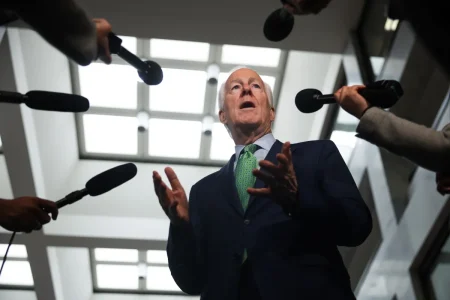Charlie Kirk: A Life Cut Short, A Legacy of Faith and Impact
In a tragic turn of events, Charlie Kirk, the 31-year-old founder of Turning Point USA, was fatally shot at Utah Valley University in Orem, Utah last Thursday. His final message on social media read, “Jesus defeated death so you can live” – a poignant testament to the faith that guided his life’s work. Kirk leaves behind his wife Erika Frantzve, a former Miss Arizona USA whom he married in May 2021, and their two young children: a 3-year-old daughter and a 1-year-old son. The sudden and violent nature of his death has sent shockwaves through conservative circles, faith communities, and among the countless young people he inspired during his brief but impactful life.
Kirk’s legacy extends far beyond traditional political activism. Through Turning Point USA and its faith-focused branch, TPUSA Faith, he created platforms “dedicated to empowering Christians to put their faith into action.” Pastor Rob McCoy, co-chair of Turning Point Faith and a close friend of Kirk’s, reflected on the profound loss, saying, “He built it all with the power of the spoken word. He never used violence but was threatened every day with violence by those who couldn’t contend with logic and truth.” McCoy emphasized that Kirk faced threats with remarkable courage because of his faith in Jesus Christ, which allowed him to live without fear of death. “Charlie did not die,” McCoy stated. “Instead, he has begun to truly live. His life was secured eternally by His Savior, Jesus Christ.” As McCoy travels to be with the Kirk family in their time of grief, he carries the conviction that “evil has not prevailed, and it will not win.”
The relationship between Kirk and faith communities was significant and mutually reinforcing. McCoy revealed that his church was the first to invite Kirk to speak, noting that initially, Kirk “didn’t think any church would want him.” This hesitation evolved into a powerful ministry as Kirk became increasingly comfortable sharing his faith publicly. Conservative social media activist Robby Starbuck, a longtime friend of Kirk’s, highlighted that “aside from being a father, perhaps Charlie’s greatest achievement is talking about God to young people during a time when too many were afraid to do that.” Starbuck credited Kirk with sparking “a revival on college campuses all over the nation” and emphasized the responsibility that now falls to others to “carry on his work.” Will Witt, who worked with TPUSA for two years, described Kirk as “one of the most godly men I knew,” possessing “a bold and courageous faith” that went beyond conventional expressions of belief to embody “a steadfast, brilliant and strong belief that inspired everyone around him.”
Kirk’s approach to faith was deeply intertwined with his vision for America and its younger generations. Through TPUSA Faith, he sought to “engage, equip, and empower millions of grateful Americans who are prepared to defend our God-given rights, by giving them the tools to expose lies and articulate the connection between Faith and Freedom.” This mission reflected Kirk’s conviction that religious values and liberty were inseparable, and that young people needed guidance in understanding this relationship. His work consistently emphasized the importance of bringing faith-informed perspectives into public discourse, particularly in academic settings where traditional religious viewpoints often face skepticism or marginalization. The organization he built became a vehicle for young conservatives to explore how their faith could inform their civic engagement and political perspectives.
The circumstances of Kirk’s death have prompted reflection on the increasingly volatile nature of American political discourse. Pastor Robert Jeffress of Dallas, who had previously welcomed Kirk to speak at his church, framed the tragedy in spiritual terms: “The cold-blooded murder of Charlie Kirk is an illustration of what Jesus said, that Satan is alive and he’s working in the world today. Jesus called Satan a murderer from the beginning. He is a thief who comes to kill, steal and destroy.” Jeffress called for Americans to pray for the Kirk family while emphasizing that the best way to honor Kirk’s memory would be to continue “speaking truth in love,” as Kirk himself had done. The pastor offered spiritual comfort by affirming his belief that Kirk is now “at home with Jesus Christ,” with the promise that “one day those of us who know Christ as Charlie did will be reunited forever in heaven.”
As the nation grapples with this loss, Kirk’s life and work stand as a reminder of the power of conviction and the impact one individual can have when driven by deep faith and purpose. At just 31 years old, he had built an organization that touched countless lives, particularly among young Americans searching for meaning and direction. His emphasis on integrating faith with civic engagement created spaces where politically conservative Christians could explore their beliefs and apply them to contemporary issues. While his perspectives were not universally shared, even his critics would acknowledge the remarkable reach of his message and the devotion of his followers. As those who knew him mourn his passing and celebrate his legacy, Kirk’s final message about Jesus defeating death takes on new meaning – a testament to the faith that defined his life and now, in the eyes of those who shared his beliefs, defines his eternity.















